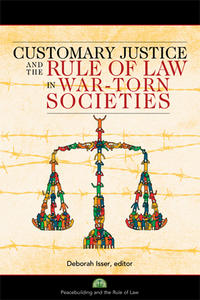 “Brilliantly structured, this important book provides a realistic, honest, and original analysis of the tension between universal human rights and customary justice in post-conflict societies. It argues, persuasively, that customary justice systems should not be rejected simply because they do not conform to idealistic visions of the rule of law. Each of its seven case studies offers an outstanding contextual analysis that elucidates the critical roles that informal justice can play in strengthening legal institutions.”
“Brilliantly structured, this important book provides a realistic, honest, and original analysis of the tension between universal human rights and customary justice in post-conflict societies. It argues, persuasively, that customary justice systems should not be rejected simply because they do not conform to idealistic visions of the rule of law. Each of its seven case studies offers an outstanding contextual analysis that elucidates the critical roles that informal justice can play in strengthening legal institutions.”
—Julio Faundez, professor of law, Warwick University
“This volume features an incredible amount of historical and descriptive detail. Indeed, each chapter reads like a mini-treatise on the topic of law in each country or region.”
—Mark Goodale, author of Surrendering to Utopia: An Anthropology of Human Rights
“Inspired by the theory of legal pluralism, the seven case studies in Customary Justice examine empirical research material collected from societies in Africa, Asia, and Latin America to grasp local justice, its perception, and its contribution to achieve accepted solutions to conflicts. The book addresses the complex legal realities that are not included in conventional law books, case law, and statutes. Customary Justice contributes to a better intercultural anthropological jurisprudence, and offers action-oriented recommendations in its concluding chapter.”
—Manfred Hinz, professor, faculty of law, University of Namibia
“This work represents possibly the most important contribution of the past decade for practitioners and policymakers seeking to leverage international rule of law assistance into long term institutional and societal strength. These case studies provide a wealth of insight and applicability in other contexts where billions will be spent and blood spilt in the hopes of reinvigorating accessible and legitimate systems of justice and accountability. Beginning with the truism that communities define justice through their own prism of cultural norms, social experience, and historical reality, these essays provide pragmatic details for those seeking to attain authentic justice that serves affected populations and supports the ends of societal stability. This volume might well be seen as the raison d’être for the U.S. Institute of Peace. It is a source of guidance for future efforts to navigate the recurring tension between traditional approaches with deeply rooted legitimacy and more formalized systems designed to advance an entrenched rule of law compliance needed to sustain lasting peace.”
—Michael A. Newton, professor of the practice of law, Vanderbilt University Law School
“Efforts at law and development have proven extremely difficult under favorable circumstances, and all but impossible in postconflict situations. Yet development organizations have continued to apply the same tried and failed formulas that focus exclusively on building state legal institutions. Customary Justice and the Rule of Law in War-Torn Societies takes a different approach. The contributions to this collection recognize that customary forms of law often function quite effectively to serve local needs. Each chapter provides a detailed and comprehensive case study that examines customary systems, state legal systems, and their interaction, noting the strengths and weaknesses of each, and closes with a set of practical recommendations. This fascinating book exhibits a great deal of insight and offers sound advice from scholars and practitioners with years of experience in the field. It is a must read for anyone interested in legal development.”
—Brian Tamanaha, Washington University Law School
- Customary Justice Systems Play an Important Role in Postconflict Justice Strategies
News Release | October 5, 2011 - Read a Q+A with the authors
The views expressed in this publication are those of the author(s).